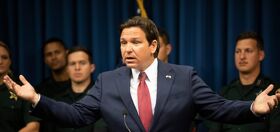Journalist Rachel Maddow knows a thing or two about the media. Not only does she have her own show on Air America, but the 34-year old political junkie also appears regularly on MSNBC. And, as you’ll see in the video above, she’s not a wallflower.
Our editor recently sat down with Maddow to talk about the Hillary Clinton New Hampshire scandal, why we need to talk about race and how she embarrassed herself in front of Keith Olbermann…
Andrew Belonsky: I want to start with the Chris Matthews/Hillary Clinton brouhaha. As you pointed out on MSNBC, Talking Points Memo was talking about how women voted for Hillary in New Hampshire because Chris Matthews and other male news personalities were picking on her. Do you think that’s valid? Do you think that people really are swayed so easily?
Rachel Maddow: I don’t. Certainly there’s no statistical evidence to support that that’s why people unexpectedly voted for Hillary Clinton, but there’s not that much of an explanation for why Hillary Clinton defied the last two days of polling. She was ahead in New Hampshire all year – the last four days of polling for Obama were very strong, but she had been leading all year. If you actually look at the exit polls and the people who voted for her, it wasn’t people who decided the last day or the last couple of days. The people who turned out and voted for Clinton had decided, like 50% or something, had decided more than a month ago that they were going to vote for her. What made the difference is that they turned out in huge numbers. Now, could we emotionally explain that turnout as being mad at the media? Maybe. That’s what political analysis is: putting an emotional frame for which we don’t have facts.
AB: Really? You think emotion is inherent in political analysis?
RM: I think that political analysis is taking observable facts and working them into a story that makes sense to people and sticks with people. Making things into a story requires understanding people’s emotions- you not only play into people’s emotions, but you incorporate them. That leads to how you tell the story. I said that on MSNBC, because I was feeling it. I mean, I’m not a Hillary Clinton fan, but the last few days of coverage of her – once those Obama polls were coming out, there was almost glee from the 95% male newscasters. Their palatable excitement about how she was going to lose was gross. That’s the only thing that has ever made me feel sympathetic for Hillary. That clip that we all saw of her being emotional at that campaign appearance, I think it was a genuinely affecting moment for more than half the people that saw that tape, but yet more than half the time it was presented in the media, there was cynical, nasty, joy in her pain. There were white guy journalists being like, “Ha! Look at the bitch crying” or “She’s obviously faking this just to dupe stupid women voters”. The consistent mean in the media was infuriating. I felt it and I was seeing it everywhere in the blog world.
AB: I was talking to Mary Breslauer recently and we spoke about how the lines are breaking down between media and political personalities. They’re almost becoming one and the same. The definition of a politician is not necessarily someone who is elected to office. Do you think that the media has gained too much power – particularly with regard to the elections – but in shaping the zeitgeist?
RM: Well, the media has always been tremendously powerful. In historical context, it isn’t new that the media is shaping how we view people, but I think what’s happening right now is that we have newsish entertainment. We have people who are political operatives who dress up like news anchors and talk about really important political stories with some authority that they have not earned through journalistic credentials. That’s not to say that those folks shouldn’t be on tv – that’s not to say that I shouldn’t be on tv – I think there’s a love for punditry in political analysis, which is to take facts and make them understandable and help put a context and an emotional frame on what we’re seeing, so more people are compelled by the politics of the moment. It’s an important role and it’s actually, I think, a civically honorable role.
AB: I’m not sure everyone would agree with you, but I certainly do.
RM: What happens sometimes – and I think you saw this with Chris Matthews – the media tends to bandwagon. The higher the ratio of analysis to – you know, seeing five hours of cable new coverage to every AP story with one fact is a totally normal day in political news – the higher the ratio of analysis, the more likely is that the people talking about that fact are going to get on some stupid bandwagon and they’re all going to say the same thing and they’re all going to make the same point. Because it’s all white guys who are all beltway guys – the whole pundit corp is so homogenous – occasionally, especially when you’re talking about minority candidates and female candidates, their band wagon story is wrong.

AB: Do you feel like an outsider in the media world when you’re in Iowa or you’re in Michigan or where ever you may end up?
RM: I kind of always feel like an outsider. I remember when I walked – when MSNBC asked me to do Iowa night coverage, I was so flattered that they asked me, it was really nice. I mean, I don’t work for them, they don’t pay me – and I had been expecting to anchor Air America’s coverage that night, but when MSNBC asked me to do it, I was like, “Oh, that’s really nice”. So, I showed up that night and walked into the make-up room and there are Kelly O’Donnell, an anchor I don’t know and Keith Olbermann sitting in the make-up room and I walked in and, like an idiot, without thinking, say, “Aw, I feel like I’m getting bumped up from the kid’s table at Thanksgiving,” which was a dumb thing to say because A. self-deprecation doesn’t help in a professional context if you’re trying to seem like a bigger deal than you are and, B, I’m subliminally calling them old, which is not a nice thing. But that’s honestly how I felt: I get to be in the adult media! I do feel like – I dress like a first grader, I’m a big lesbian, I’m not pretty like a Barbie doll and I come from talk radio, which is the wild west of media… In a lot of ways I do not fit the mold, but I get a lot of air time and I have a great time doing it and always really happy to be up there, otherwise I wouldn’t do it at all.
AB: The election can be overwhelming. I’m thinking about the next ten, eleven months of covering this and it sort of makes me sick.
RM: I know. Especially if Hillary Clinton is going to be one of the people who goes the distance. Whether or not she gets the nomination, she’s certainly going to be – imagine if Barack Obama gets the nomination, even if that’s true, it’s not like Hillary Clinton isn’t going to be there until the very, very end. If we still have to go through the ridiculous “She can’t show emotion, because she’s too much of a woman,” “She’s not showing emotion, she’s an ice queen:” this stuff from 1970! Pundits are not able to grasp a woman candidate at all! Like Drudge showing the pictures of the lines on her face…
AB: That’s so fucked up.
RM: He does it all the time! And, you know, if Barack Obama goes the distance – it’s like you’re in a Rudyard Kipling novel when you talk about him: “Oh, the third world candidate, the son of Kenya…” The racist bullshit!
AB: What’s interesting about the race and campaigns – especially when Barack and Hillary made peace a few weeks back – we have two things happening here. We have a black man running for president – and he could very well win this election – so naturally that’s going to bring up topics of race, which I think, in the end, is good, because America needs to talk about race a little more.
RM: True.
AB: But then we have the campaigns saying “We’re not going to talk about race”. How can we strike a balance between race doesn’t become a campaign issue and ensuring that Americans use this opportunity to talk about race?
RM: I think that’s really going to be a key point. I think that Obama has essentially – Obama and Clinton both – their little truce was saying “Let’s not bicker about Martin Luther King, let’s agree that Martin Luther King was a good guy. Let’s agree that we’re pro civil rights”. I think they’re saying, “Let’s not have a fake fight about race”. And race is not – in politics – a fight about race is not going to serve us well. A conversation about race is – and I think it’s going to be hard to do. I think the way to do it is to talk about the different experiences of white Americans and black Americans today in 2008 in terms of domestic issues that often don’t get a racial run put on them: access to health care, access to the economy, job issues, prison issues, criminal justice issues, the racist elements of the immigration debate. If we can be overt about how race effects all of these other political issues that we never mention race about, I think we’ll be better off.




















Amber LeMay
I always liked seeing RM on Tucker Carlson’s show… between the two of them and Max Kellerman it was the gayest thing on cable!
Rachel is great on radio AND television.
Alexa
Excellent interview, Andrew.
As to people voting for Hillary because of Chris Matthews, I think that’s actually a real possibility. I’m by no means a Hillary supporter, but the way he (and the rest of the media) have piled on her, especially between Iowa and NH, if I lived in NH I would have been tempted to vote for her just as a fuck you to the media and their incessant pro-Obama coverage at that time, much of which was incredibly misogynistic. In reality, I’m sure I would have come to my senses, but I can definitely see women who might not otherwise have bothered voting, coming out in support of her.
seitan-on-a-stick
Is the word “Lesbian” banned? Are we so ashamed that we only say the L word. I had to look up Sappho again (No, it’s not Ab Fab’s Edwina’s conservative daughter) I Love Rachel Maddow but Randi Rhodes is my “grrrl”, and I’m a red-blooded Gay Man. Yes, Alexa, it seems to be a Man’s world with this unrelenting Hillary-bashing. This “Kill the Queen” mentality will hopefully receive a backlash on Super Tuesday from the Great Deciders: Single WOMEN. We ARE Hillary, hear US roar!
Jack Jett
Great interview Andrew with my favorite chick on TV.
MSNBC should kick Carlson to the curb and bring in Lady Rachel
ekeby
Great idea! Replace Carlson with Rachel! Soon!
uidiuguhufugh
Porn Video Free Best SEX ZOO , [url=http://forums.lfgcomic.com/index.php?showuser=12940]SEX ZOO[/url] , http://forums.lfgcomic.com/index.php?showuser=12940 – SEX ZOO ,
ANIMAL SEX TUBE , [url=http://www.dubforce.net/forums/index.php?showuser=4552]ANIMAL SEX TUBE[/url] , http://www.dubforce.net/forums/index.php?showuser=4552 – ANIMAL SEX TUBE ,
uidiuguhufugh
Tube Free Best Porn DOG SEX TUBE , [url=http://www.dubforce.net/forums/index.php?showuser=4548]DOG SEX TUBE[/url] , http://www.dubforce.net/forums/index.php?showuser=4548 – DOG SEX TUBE ,
SEX ANIMAL TUBE , [url=http://www.theuberfall.com/forums/index.php?showuser=367]SEX ANIMAL TUBE[/url] , http://www.theuberfall.com/forums/index.php?showuser=367 – SEX ANIMAL TUBE ,
ypopoypopo
Sex Videos Best Porn Porno Tube porn animal , [url=http://www.titaxium.com/forum/index.php?showuser=8654]porn animal[/url] , http://www.titaxium.com/forum/index.php?showuser=8654 – porn animal ,
animal porn , [url=http://forum.thelivecommunity.it/index.php?showuser=8953]animal porn[/url] , http://forum.thelivecommunity.it/index.php?showuser=8953 – animal porn ,
ypopoypopo
Sex Videos Best Porno Porn Tube porn animal , [url=http://forums.macgeneration.com/membres/porn-animal.html]porn animal[/url] , http://forums.macgeneration.com/membres/porn-animal.html – porn animal ,
horse sex tube , [url=http://forum.thelivecommunity.it/index.php?showuser=8960]horse sex tube[/url] , http://forum.thelivecommunity.it/index.php?showuser=8960 – horse sex tube ,
dfigkldrle
Movies Sex Best Free porn animal , [url=http://forums.macgeneration.com/membres/porn-animal.html]porn animal[/url] , http://forums.macgeneration.com/membres/porn-animal.html – porn animal ,
animal human porn , [url=http://forum.thelivecommunity.it/index.php?showuser=8954]animal human porn[/url] , http://forum.thelivecommunity.it/index.php?showuser=8954 – animal human porn ,
islddushgsd
Porn Porno Videos Tube Best Sex Tube Videos Sex Porn Porno Best , animal porn animal porn , http://www.mastforum.com/index.php?showuser=17752 – animal porn ,
Tube Free Best Porno , free zoo tube sex free zoo tube sex , http://www.mastforum.com/index.php?showuser=17758 – free zoo tube sex ,
islddushgsd
Videos Porno Best Porn Tube Sex Best Tube Porn Sex Porno Videos , free animal porn clips free animal porn clips , http://www.mastforum.com/index.php?showuser=17757 – free animal porn clips ,
Sex Tube Best Porno Porn Videos , free movies of animal sex free movies of animal sex , http://www.quellicheilcell.it/index.php?showuser=20450 – free movies of animal sex ,
rudy
Now, not only are the preview and reply buttons gone, but the flag as well, and eight sick spammers have posted links to animal porn on this thread.
Queerty?
ghrjrfggjgjr
Porn Videos Sex Best Tube Porno http://www.moviemotion.nl/forum/index.php?showuser=15141 zoo sex tube ,
http://www.moviemotion.nl/forum/index.php?showuser=15138 sex zoo ,
http://www.calgoldonline.com/forums/index.php?showuser=1315 dog sex tube ,
http://www.moviemotion.nl/forum/index.php?showuser=15149 porno dog sex tube ,
http://www.calgoldonline.com/forums/index.php?showuser=1301 animal sex tube ,
http://www.expertlaw.com/forums/member.php?u=98472 sex zoo ,
ghrjrfggjgjr
Best Sex Videos Porno Porn Tube http://www.expertlaw.com/forums/member.php?u=98479 free animal sex tube ,
http://www.expertlaw.com/forums/member.php?u=98468 porn animal sex ,
http://www.moviemotion.nl/forum/index.php?showuser=15144 animal human porn ,
http://www.moviemotion.nl/forum/index.php?showuser=15143 animal porn ,
http://www.calgoldonline.com/forums/index.php?showuser=1304 sex zoo ,
http://www.expertlaw.com/forums/member.php?u=98467 zoo sex ,
jyordidigjfugi
All Good Websites PORN ANIMAL SEX , [url=http://www.protopage.com/rweterf]PORN ANIMAL SEX[/url] , http://www.protopage.com/rweterf – PORN ANIMAL SEX ,
SEX ANIMAL TUBE , [url=http://www.protopage.com/hfgghfghf]SEX ANIMAL TUBE[/url] , http://www.protopage.com/hfgghfghf – SEX ANIMAL TUBE ,
jyordidigjfugi
All Good websites ANIMAL PORN , [url=http://forums.buddytv.com/members/cwerka.html]ANIMAL PORN[/url] , http://forums.buddytv.com/members/cwerka.html – ANIMAL PORN ,
ZOO SEX TUBE , [url=http://www.protopage.com/ekalmhopl]ZOO SEX TUBE[/url] , http://www.protopage.com/ekalmhopl – ZOO SEX TUBE ,
jyordidigjfugi
Very Good Websites PORN ANIMAL , [url=http://www.protopage.com/tertertty]PORN ANIMAL[/url] , http://www.protopage.com/tertertty – PORN ANIMAL ,
ZOO SEX , [url=http://forums.oxygen.com/index.php?showuser=34827]ZOO SEX[/url] , http://forums.oxygen.com/index.php?showuser=34827 – ZOO SEX ,
jyordidigjfugi
Very Good Sites FREE ANIMAL PORN VIDS , [url=http://forums.buddytv.com/members/vewasd.html]FREE ANIMAL PORN VIDS[/url] , http://forums.buddytv.com/members/vewasd.html – FREE ANIMAL PORN VIDS ,
FREE ANIMAL PORN VIDS , [url=http://www.protopage.com/looaytt]FREE ANIMAL PORN VIDS[/url] , http://www.protopage.com/looaytt – FREE ANIMAL PORN VIDS ,
jyordidigjfugi
Love This Site PORN ANIMAL , [url=http://ig4l.net/forum/member-garada-m104696.html]PORN ANIMAL[/url] , http://ig4l.net/forum/member-garada-m104696.html – PORN ANIMAL ,
FREE ANIMAL SEX TUBE , [url=http://forums.buddytv.com/members/sapla.html]FREE ANIMAL SEX TUBE[/url] , http://forums.buddytv.com/members/sapla.html – FREE ANIMAL SEX TUBE ,
asncuvophjg
Hello oiled sex video , http://www.omfgg.com/profile/reddaesr – oiled sex video ,
DOG SEX VIDEO , http://www.jguru.com/guru/viewbio.jsp?EID=1542792 – DOG SEX VIDEO ,
lindsay lohan sex tape now
:-(, Only lindsay lohan sex tape, [url= http://www.bloglines.com/blog/lindsaylohansextape ]Only lindsay lohan sex tape[/url], poeqq,